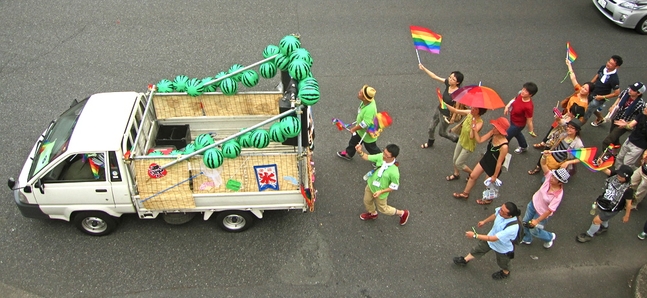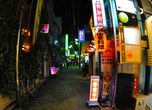Why Tokyo has no Pride
Japan's capital should have Asia's biggest gay festival. Here's why it fails

Photo by H.L.I.T./Flickr
Posted: Thu Aug 11 2011
New York, Paris, Amsterdam, Berlin, Sydney... if you’re a major city in a democratic nation, it’s likely you’ll have a pretty colourful Gay Pride parade, an event for the lesbian, gay, bisexual and transgender communities to celebrate the diversity of their culture and their right to love just whoever they please. In fact, with such global emphasis on LGBT equality and same sex marriage laws, a Gay Pride event is almost a prerequisite for any city that wants to tout its cultural richness and sophistication. From Belgrade to Istanbul, from London to Toronto, thousands hit the streets with rainbow flags, year in, year out. So why is it that Tokyo, the home of Asia’s biggest gay town, has no Pride at all?
The history is complex. Tokyo had its first Lesbian Gay Parade in 1994, hosted by the Japanese branch of the International Lesbian and Gay Association (JILGA). The event continued annually until the late ’90s, though the emphasis on taking a strong political stance alienated many potential supporters, and it eventually fizzled out.
In response to the demands from sexual minority groups for a more festive Pride, Tokyo Lesbian and Gay Parade (TLGP) took up the baton in 2000. TLGP attracted plenty of participants, and was successful in making the event a celebratory and social affair, while simultaneously accommodating the hardliners’ political agenda. When TOKYO Pride, the organizing body of TLGP, was officially inaugurated, it seemed as though the city finally had official representation. Sadly, internal conflicts, poor management, a lack of funding and an absence of competent leadership saw TOKYO Pride dwindle by the mid noughties, and the accompanying festival became an on-and-off affair (it has been held seven times this millenium). TOKYO Pride will not be taking place this year, and there has yet to be any announcement about whether it will be held in 2012.
The failure to hold an annual festival shouldn't just be blamed on the organizers, however. Japan remains a conformist and conservative society in which being gay is a taboo. Sexual minorities continue to be stigmatized as abnormal (the term ‘normal’, instead of ‘straight’, is still used to describe heterosexuality) and the public’s knowledge of LGBT issues in general is astonishingly low. Japan is the only G7 nation that doesn’t secure the rights of same sex couples by law, and in December 2010, Tokyo Governor Shintaro Ishihara publicly commented that homosexuality is a ‘genetic defect’ – and got away with it.
In such a climate, publicly coming out is not an option for many people. Participating in a Pride parade in Tokyo isn't so much a stroll down the Yellow Brick Road, more a walk up the Hill of Golgotha. In the past, participants have worn sunglasses and hats to disguise themselves – making them look more like child snatchers – or chosen to stick close to the ‘no photos’ float, which the media are not allowed to photograph. They might as well be shouting ‘we’re queer, but pretend we’re not here!’
This lack of ostentation, coupled with limited interest from the public at large, leads to a very low media presence. In the past, Tokyo Pride has been held during the Obon holidays (one of two occasions when the capital's streets are practically deserted, the other being New Year), meaning that few people take any notice of the parade. It has been so inconspicuous, in fact, that most Tokyo residents don’t even know that it takes place, let alone what Pride actually means.
Although it will take time and a lot of effort for Tokyo to regain its Pride, it should be noted that successful annual LGBT festivals have been held in Osaka since 2006 and Sapporo since 1996. Unlike past Prides in Tokyo, these events are officially supported by their respective municipal governments and are amicably received by the general public.
If Japan wants to maintain its position as a civilized democracy, it will inevitably have to devise legal rights for sexual minorities. People – politicians especially – will have to be properly educated about homosexuality, and a Pride event in the capital city could become the driving force. One of the organizers for a regional LGBT festival once said in an interview, ‘It is difficult and presumptuous of us to change how people think. But hopefully our proud presence will give people the opportunity to imagine a society with no prejudice and discrimination.’
That’s exactly what Pride is supposed to be. It’s time Tokyo got proud.
Tweets
- About Us |
- Work for Time Out |
- Send us info |
- Advertising |
- Mobile edition |
- Terms & Conditions |
- Privacy policy |
- Contact Us
Copyright © 2014 Time Out Tokyo














Add your comment